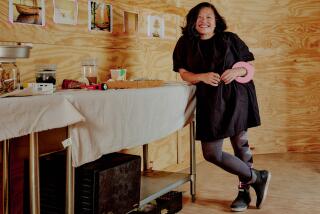Their ‘Happily Ever After’ Follows a 7-Year Ordeal
- Share via
--Once upon a time, boy met girl under the cruelest of circumstances. They now live together in the best of times. Chamnon Koy and Huy Tan are their names, and their Saturday marriage in Amherst, Mass., surely showed the power of a dream. Koy, 26, and Tan, 31, fell in love in a refugee camp in Thailand in 1979, after both were driven from their native Cambodia. In 1982, Koy made her way to the United States, but Tan, unable to find an American sponsor, wound up in Australia a year later. Koy, with help from her foster parents, Robert and Phyllis Agard of Amherst, saw Tan for the first time in three years when she visited him last summer. “We have a lot of memories that we can’t forget,” said Tan, a bookbindery machine operator. She recalled how the two shared rice when food was scarce and supported each other in sorrow over relatives lost or killed. Phyllis Agard said: “I feel as if I’m living in a soap opera. It’s an everybody-lives-happily-ever-after sort of feeling.” The couple had a traditional American wedding, but a Cambodian friend brought egg rolls and rice. “When we hear your story, it makes us have hope and believe in love more strongly,” said the Rev. Philip S. Hall in a homily. The pair will live with Tan’s two brothers and two sisters in Australia--happily ever after.
Mother Teresa passed on the food at a breakfast given in her honor in Florida. “I don’t want your abundance, I want you to experience the joy of loving,” she told the audience of 1,600 at a banquet sponsored by the Anti-Abortion Coalition of Miami. The 76-year-old nun, who won the 1979 Nobel peace prize for her work with the destitute of India, made the brief stopover in Miami on her way to visit Cuba. After the meal, she had this to say on the subject of terminating pregnancy: “If you don’t want the child, give it to me.”
--Job Matusow, director of the Gandhi Peace Center of Orange, Mass., was so convinced that the City Council of Keene, N.H., deserved recognition that his group bestowed the “Marie Antoinette Award” upon the elected officials. The award, given for flinty public relations, followed a council vote against donating $10,000 to a kitchen for needy people. The wooden sculpture of a piece of cake symbolizes the French queen’s cavalier attitude toward her subjects. (Legend has it that when she was told the people had no bread, she replied: “Let them eat cake.”) City Manager J. Patrick MacQueen, in voting to deny the request, said that the poor were being cared for and that the Keene Community Kitchen Inc. had not submitted an evaluation of its needs. Atty. Gen. Edwin Meese III was twice so “honored” by the Gandhi center--in 1983, for saying that there were no poor people in America, and in 1984, for suggesting taxing Social Security benefits.
More to Read
Sign up for Essential California
The most important California stories and recommendations in your inbox every morning.
You may occasionally receive promotional content from the Los Angeles Times.













